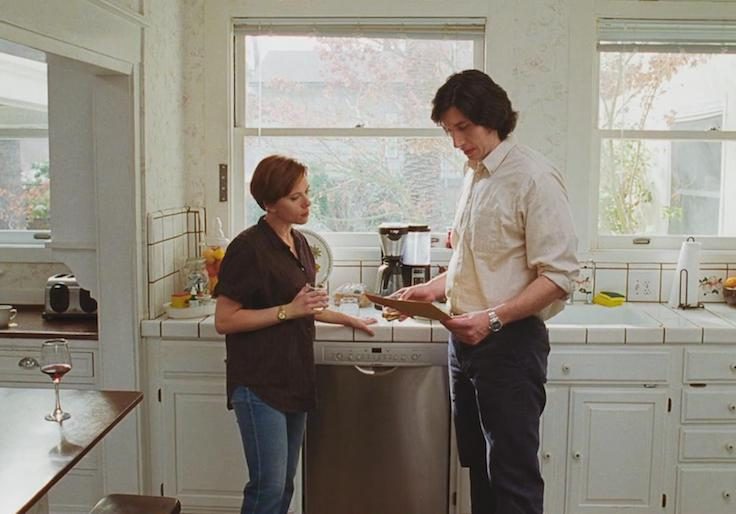I really, really didn't want to see Marriage Story, despite the rapturous reviews and the fact that it's the work of Noah Baumbach, one of the most interesting writer-directors in America. It turns out I'm not alone. People in happy marriages tell me they don't want to see it because they fear exposure to its portrayal of a marriage's end would work like exposing oneself to a norovirus. People in not-so-happy marriages don't seem to want to see it either because they fear it will push them down a path they are trying to avoid. And divorced people say they have PTSD from what they went through splitting up and don't need to relive the worst time in their lives.
Well, I was wrong and so are all of them. In fact, Marriage Story is nothing less than a masterpiece—the best American movie in years, I think. I think this so much right now that as I write, I can't think of the movie before it that would have held that title. Now you might think that its excellence would just make things worse. If Marriage Story's depiction of the end of a bad marriage is so brilliant, then surely it would be even more painful, even more awful, even more torturous to watch.
It's not. In the first place, Marriage Story tells a very specific tale about very specific people—pretentious and theatrical showbiz types about whom it is both wonderfully compassionate and viciously satirical. The movie's sociological specificity means it provides exactly the kind of distance from its subjects that keeps it from becoming too personally painful.
Marriage Story doesn't feel like it's about you and me—it's about them, these beautifully drawn characters, Nicole and Charlie, and their experiences going through the divorce mill, not ours. Baumbach renders their experiences and their behavior with such meticulous care that it’s impossible not to feel some commonality with them, to be sure. But that's art for you. At its best, it draws you in to the story of someone else's woes, not your own. Has anyone ever said she couldn't read Anna Karenina because its portrait of divorce was too painful? Marriage Story is no Anna Karenina, to be sure, but in a pinch, it'll do.
Charlie (Adam Driver) is a somewhat avant-garde theater director whose work looks so ludicrous in Baumbach's depiction that it makes total sense when he wins a MacArthur Genius Grant. Nicole (Scarlett Johansson) is an actress best known for her role in a sexy teenage movie comedy who long before surrendered her Hollywood standing to become Charlie's helpmeet and muse off-Broadway. But she can no longer tolerate being his second fiddle, and he has no interest in restructuring their lives so that her solo career might share the spotlight. So they're done.
When we meet them, their Brooklyn-based marriage is already over and they're just about to negotiate the final terms in a friendly fashion. They separate formally when Nicole gets a TV pilot and moves to Los Angeles temporarily with their eight-year-old son to film it. When she decides she wants to stay in L.A., despite Charlie's certainty that they had agreed they would remain a "New York family," lawyers get involved—and everything goes to hell.
The hell into which they descend is funny and sad, comic and tragic, absurd and knowing. Nicole has a dazzling divorce lawyer (Laura Dern) who is ready for combat. Charlie has a shleppy but ruefully wise alte kocker (Alan Alda) who counsels him to accept the reality of Nicole's wishes and concede before he is driven to penury. The friendly terms become distinctly chilly. What we see is not warfare, which might be agonizing to watch, but rather a kind of emotional attrition that's more true, more real—and funnier.
Charlie seems more reasonable and kinder than Nicole at first—and since it's clear Charlie is based on Baumbach and Nicole on his ex-wife, Jennifer Jason Leigh, it might seem like Baumbach is stacking the deck and making a revenge picture. But as Marriage Story progresses, Nicole's argument that Charlie has not been a good husband gains in force precisely because his surface levelheadedness and calm come to seem like masks that hide an overweening solipsism.
Marriage Story is two hours long and I don't think there's a false or untrue or bad second in it. It's beautiful to look at and listen to (it has a wonderfully heartfelt score by Randy Newman). There has rarely been a more perfectly cast picture. Alda and Dern (and Ray Liotta, who has two smashing scenes as a bombastic attorney) are sensationally good. Julie Hagerty, whom you will remember as the ditzy love interest from Airplane 40 years ago, is dazzling as Nicole's sweetly vicious undermining mother. An actress named Martha Kelly plays a depressed social worker in a turn for the ages.
And then there are the leads. I've never quite gotten Johansson, but Baumbach has gotten a rawness and complexity out of her—maybe because he gave her the part of her life—that make her brilliance as an actress undeniable even to me. As for Adam Driver, I don't know what to say exactly except that he gives one of the greatest of all screen performances. Period.
Driver should win the Oscar, as should the movie. He won't, I don’t think, nor will it, because life isn't fair, which is, in fact, one of the movie's implicit messages. Sometimes things don't work out. And you go on anyway.
Look, if you don't want to see Marriage Story because you fear it, that's fine. Go ahead. Be stupid. Or be smart, go to Netflix, and watch it. You already paid for it, moron!
